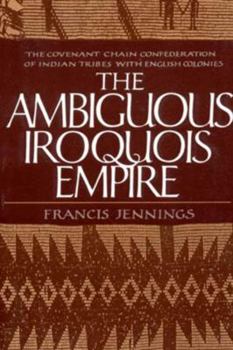The Ambiguous Iroquois Empire: The Covenant Chain Confederation of Indian Tribes with English Colonies
Select Format
Select Condition 
Book Overview
Winner of the Distinguished Book Award of the Society of Colonial Wars. This description may be from another edition of this product.
Format:Paperback
Language:English
ISBN:0393303020
ISBN13:9780393303025
Release Date:May 1990
Publisher:W. W. Norton & Company
Length:466 Pages
Weight:1.80 lbs.
Dimensions:1.3" x 6.2" x 9.3"
Customer Reviews
2 ratings
Before the revolution
Published by Thriftbooks.com User , 16 years ago
Our standard secondary school history jumps abruptly from Jamestown and Plymouth Rock to Lexington & Concord. The intervening 150 years are barely mentioned. The Jennings trilogy examines this period. In the instant volume we see the native Americans neither as passive victims nor noble savages but as politicians, diplomats, merchants and power players. Though probably doomed from the start due to the absence of immunity to European diseases, for a period of several decades they interacted with the early colonists on a basis of near parity. The Iroquois actually attempted with some skill the become the central player that would resolve the French-English rivalry and leave them at the center and in command. Jennings shows us that though this didn't happen and though the odds may have been against it such goals were far from fantasy. It's enough to cause one to imagine that "chutzpah" is a Mohawk term. One can only wonder, if the Indians had not been devastated by disease what the political map of North America would look like today.
Jennings slays a bunch of comfortable historical assumptions
Published by Thriftbooks.com User , 25 years ago
Francis Jennings, long associated with the Newbury Library American Indian collections has brought his vast knowledge to bear on the subject of the Iriquois as the fearsome 5 or 6 nations who independently cowed both their fellow tribes and the English and French colonists. He proves it wasn't so with so many documents of which we have never heard in our schoolbook history texts that I wonder how such material escaped notice previously. In the process he slays some American Sacred Cows such as Francis Parkman. One learns that the Indian frontier was no such thing and didn't exist but was a commonly inhabited piece of terrain, peopled by various tribes and the European invaders who traded with them. Relations were, for the most part, reasonably amicable, which accounts for the fact that during later wars the Eastern Indians frequently exhibited what we call civilized treatment of enemies and prisoners. (Of course there were the exceptions, usually well justified.) But in the beginning, the Dutch, Swedes, English and French, all found it necessary to deal with the various tribes quite diplomatically in order to survive, and use them in their wars of empire with one another. Furs in return for trade goods were king. The undoubted reality is such a vast contrast with the accepted picture of our frontier that this book, as well as Jennings others in this series, should be required reading to repair the damage done in our schools by claptrap such as Parkman and other revered historians who followed his lead, writing off the Indians as barabarians and the frontier as a clearly delineated line across which whites stepped only if they were willing to take their lives into their hands. Instead we find two cultures living amicably in common communities up until the first half of the 1700's when the balance was upset by driving out the Indians such as the Delewares and Shawnees so that they located in the Ohio country and became relatively independent. The Iriquois had a large hand in this and it was their undoing. Read the book. It is a complicated subject but well worth digesting. I recommend reading it in small doses and having an atlas nearby.




